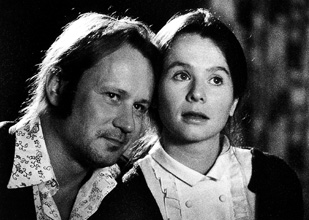
Jan (Stellan Skarsgaard) and Bess (Emily Watson) in a scene from Breaking the Waves.
The Seattle Art Museum (100 University St., 206/654-3121) SAM's Fall Film Series "Night Wind: The Film Noir Cycle" concludes December 19 with "Brainstorm" (1965). Due to a scheduling snafu, "Point Blank," which was originally scheduled for December 19, will be shown December 12. SAM's Winter Series "Winter Holiday: Fifty More Years of French Film Comedy" gets under way January 9 and runs through March 13 on successive thursdays. Series tickets for the 10 comedies (six in 35mm) are $37 for museum members and $45 for the general public. Individual tickets can usually be purchased at the door if one arrives early enough.
|
Revival or Rental Point Blank (1967) Written by Alexander Jacobs, David Newhouse, and Rafe Newhouse. Based on the novel The Hunter by Donald E. Westlake. directed by John Boorman. |
Almost before our first bite of popcorn, director Boorman shocks us with what would be the climax of any other crime film. But "Point Blank" is no ordinary film of any kind. On the deserted island of Alcatraz, Walker (Lee Marvin), his wife Lynne (Sharon Acker), and partner Mal Reese (John Vernon) heist a bag containing $93,000 from two hoods who've been using the island as a drop point. To Walker's dismay, Reese guns down the two men, turns to him and exalts, "We made it!" To which Walker disgustedly replies, "We blew it!" (It's a line that two years later would be central to another portrait of a doomed stoic on the dead end road to an American Dream gone bad in Dennis Hopper's "Easy Rider.") Later, after counting the money, Reese shoots Walker in front of his horrified wife. Apparently he needs the whole amount to buy his way back into the syndicate. Before the opening credits are over, Reese and Lynne have fled and Walker is suspended in a netherworld between life and death.
|
January 9 Boudu Saved From Drowning (1932). In French with English subtitles. Written and directed by Jean Renoir. |
In his mind Lestingois (Charles Granval) casts himself as a Pan-like god and his maid Anne Marie (Severine Lerczinska), with whom he has been dallying behind his bored wife's back, as an adoring nymph. Director Renoir even supplies a sweetly seductive melody from the flute of a nearby neighbor. But just as often, this rotund, middle-aged bookseller falls asleep when he's supposed to be stealing up to her room. Near their staid bourgeois home the river Seine runs through the heart of Paris. To Renoir, the river signifies life's blood, yet they are seemingly oblivious to it until one day when Lestingois, who has been eyeing women with his telescope, sees the vagabond Boudu (Michel Simon), a normally noisy, merry god, jump in the river "to save himself." Ripe for a self-inflating adventure, Lestingois dives in, rescues him, and takes him home hoping to reform this wild satyr. Clearly, it is their lives that need salvation through disruption, and Simon dives into the role of the guileless Boudu with bawdy relish creating hilarious havoc in the household. He's a dangerous, untamable Priapus seducing the maid and Mme. Lestingois (Marcelle Hainia). The danger, though, comes from his very wildness, not from malice. When a boating accident returns him to the river from whence he came, we are left with the curious feeling of having witnessed a mythical creature made flesh.
|
January 23 The Story of a Cheat (1936). In French with English subtitles. Written and directed by Sacha Guitry. |
Told in flashback, this tale of a boy "who wanted so badly to become honest" but throughout his life "gets offers only to commit crimes" skitters along in a stagy way (Guitry wrote more than 120 plays before making films) yet is captivating nonetheless. Guitry himself plays the lead, a gambler who, having won and lost a fortune, sits down to write his memoirs in an outdoor cafe across from the house he won and later lost in a card game. He recounts how, as a boy in a family of 12, thievery indirectly made him the lone survivor of a meal of poisonous mushrooms. After being swindled out of his inheritance by cousins who took him in, he ventures out on his own, becoming a bellboy, doorman, elevator operator, card dealer, and card shark. While the temptation to go straight threatens his fortune, the women he meets along the way manage to keep him for a time on the crooked path to success. It's a lively comedy that opens with the director in voice over introducing the cast and crew on the set. It recalls Orson Welles's oft-seen trailer for "Citizen Kane." Influenced by his radio experiences, Welles used narration in portions of several films, and once wished he'd had the opportunity to use it more extensively. In "The Story of a Cheat," Guitry takes the strategy to the extreme, inventively using narration nearly from beginning to end. We see almost all the duties of a bellboy in the brief time it takes to describe them, and when he describes Monaco and Monte Carlo the camera pans between the two. Guitry has condensed his scenes to coincide with the rhythms of his speech. The result is self-indulgence at its most charming.
 |
 |
 |
 |
 |
Contents on this page were published in the January/February, 1997 edition of the Washington Free Press.
WFP, 1463 E. Republican #178, Seattle, WA -USA, 98112. -- WAfreepress@gmail.com
Copyright © 1997 WFP Collective, Inc.
